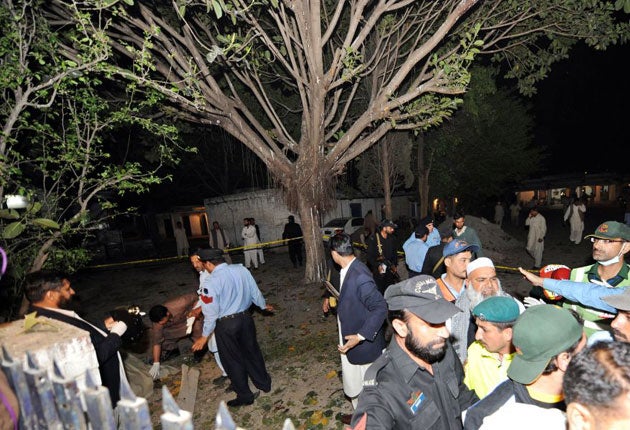Officer killed after suicide bomber targets Islamabad
Terrorist strike in heart of capital mars Pakistan's annual national holiday

Militants underlined their ability to strike at the heart of Pakistan when a suicide bomber attacked a police station in Islamabad yesterday, killing one officer and injuring at least one other as the country was celebrating its national day.
In the first assault in the capital since October, when insurgents targeted the headquarters of the anti-terrorism squad, the bomber set off his device just after evening prayers at the entrance to a police station used by special branch officers in the Sitara market neighbourhood. The attacker was also killed.
"It was a huge, huge blast," said Ali Raza, 31, who had been praying at a nearby mosque. "We knew immediately it was the special branch headquarters. When I came to the gate, I saw a body lying there. A bloodied leg was lying separately."
Special branch officers are usually deployed to guard VIPs and gather intelligence. The location of their office is not well known and they operate discreetly in plain clothes. The headquarters of Pakistan's notorious military agency, the Inter-Services Intelligence (ISI), is also nearby. The attack came on Pakistan's National Day – a public holiday that commemorates the date when the country's founders declared their intention to carve a Muslim state out of British India.
The target and the occasion underscore the reality that militants in Pakistan are willing and able to strike anywhere at any time. Earlier this month, gunmen attacked the Sri Lankan cricket team in Lahore.
Yesterday's bombing came after a week in which many people believed the country had taken a turn for the better, and in which the ousted Chief Justice Iftikhar Chaudhry was reinstated as the country's top judge following three weeks of protests by lawyers and opponents of the government. Today, Judge Chaudhry is due to hear his first case since his return.
On Sunday, hundreds of Chaudhry supporters gathered outside his villa opposite the Marriott Hotel, which was destroyed in a bomb attack last September that killed more than 50 people. Carrying balloons and beating drums, Islamabad's Christians, madrasa students, lawyers and journalists cheered as the flags of the Supreme Court and Pakistan were raised on the lawn.
The government is under pressure from the US and other Western nations to take action against militants based along the country's border with Afghanistan. But both civilian and military officials complain that their offensive is being undermined by America's continued use of missile strikes to target suspects, which often results in the deaths of innocent civilians and stokes anti-US sentiment.
Yesterday, President Asif Ali Zardari urged Britain and the US to do more to help his government fight terrorism. He said his Pakistan People's Party had brought democracy to the nation after eight years of military rule by General Pervez Musharraf, whose administration received considerable support from the West, and it was time for the international community to play its part. He said: "The message is, 'You've got democracy, democracy is part of the solution – but the second part of the solution is with you, so please give us the help we need'."
President Barack Obama is set to unveil his strategy for Pakistan and Afghanistan in the coming days. So far, his administration has shown little inclination to shift away from previous US policy on Pakistan, and insists it has the right to use missile strikes to try to kill suspected terrorists inside the country.
However, Mr Obama has said he will increase US troop numbers in Afghanistan by 17,000.
Join our commenting forum
Join thought-provoking conversations, follow other Independent readers and see their replies
Comments
Bookmark popover
Removed from bookmarks